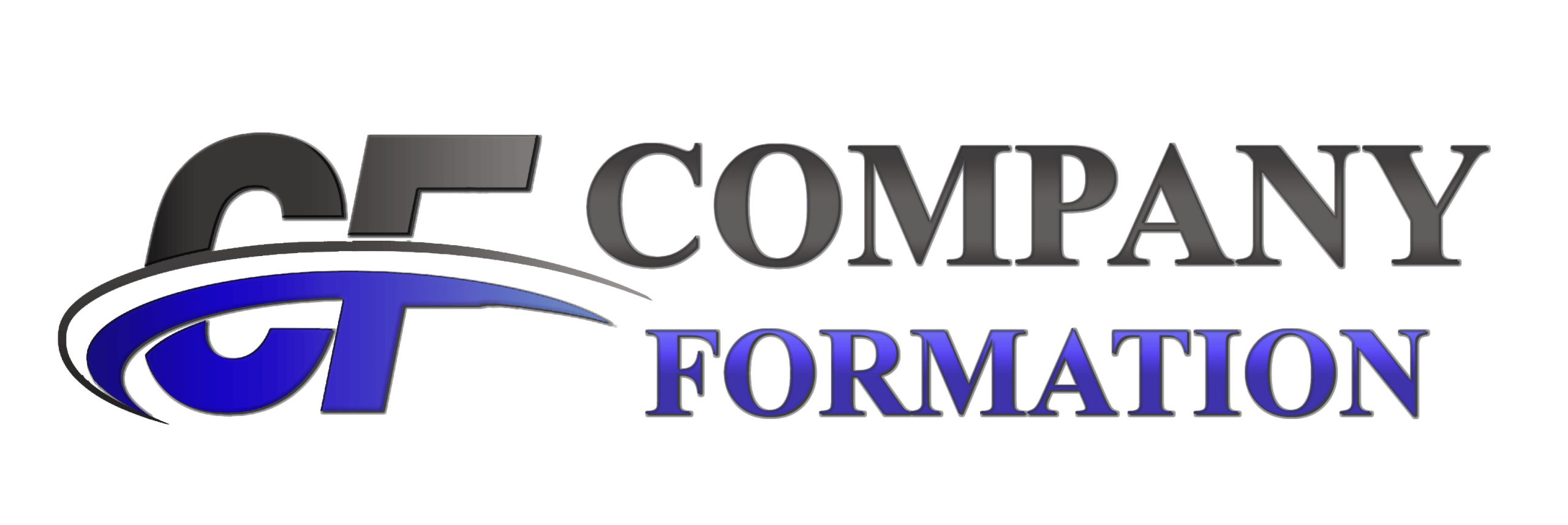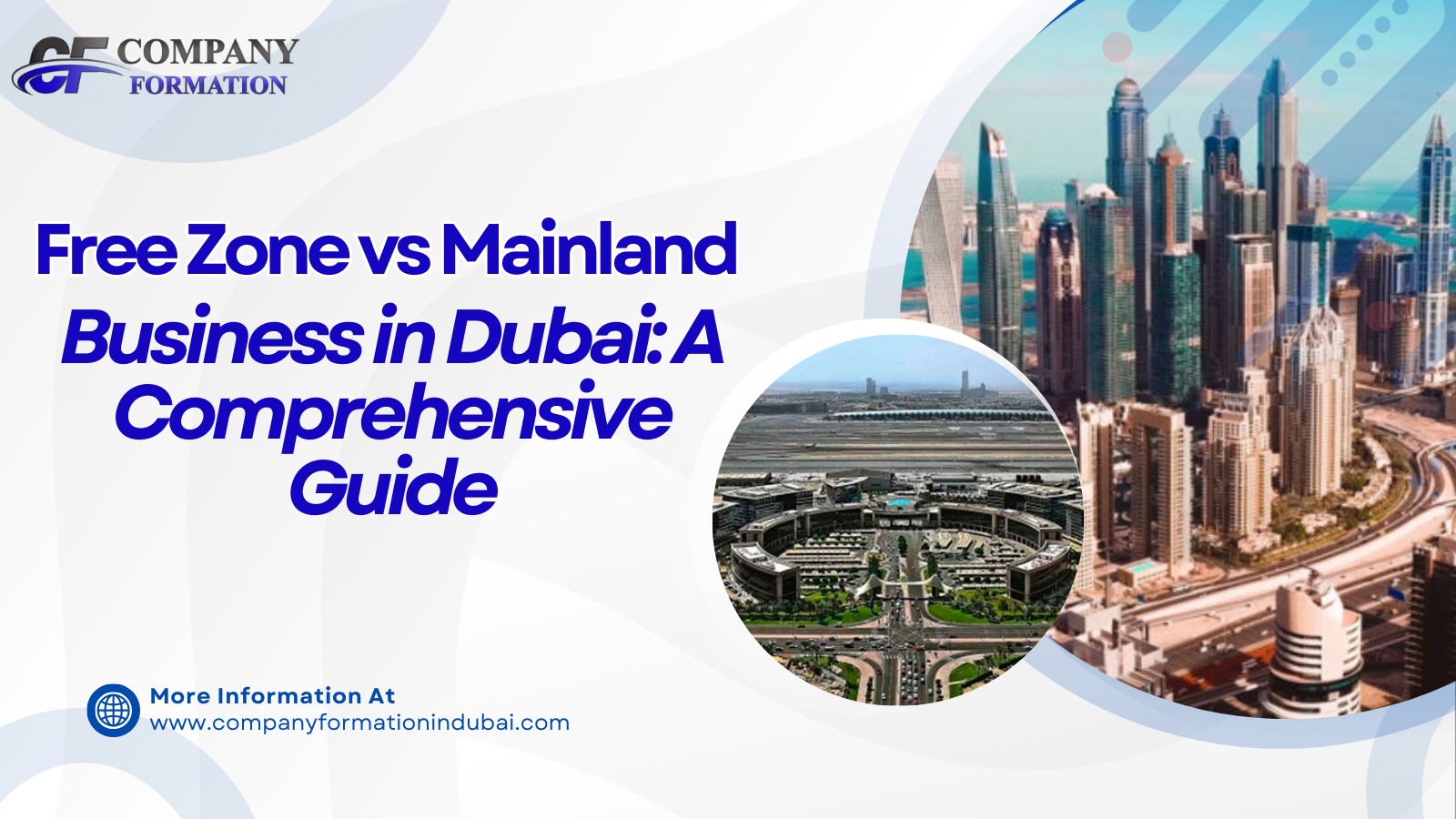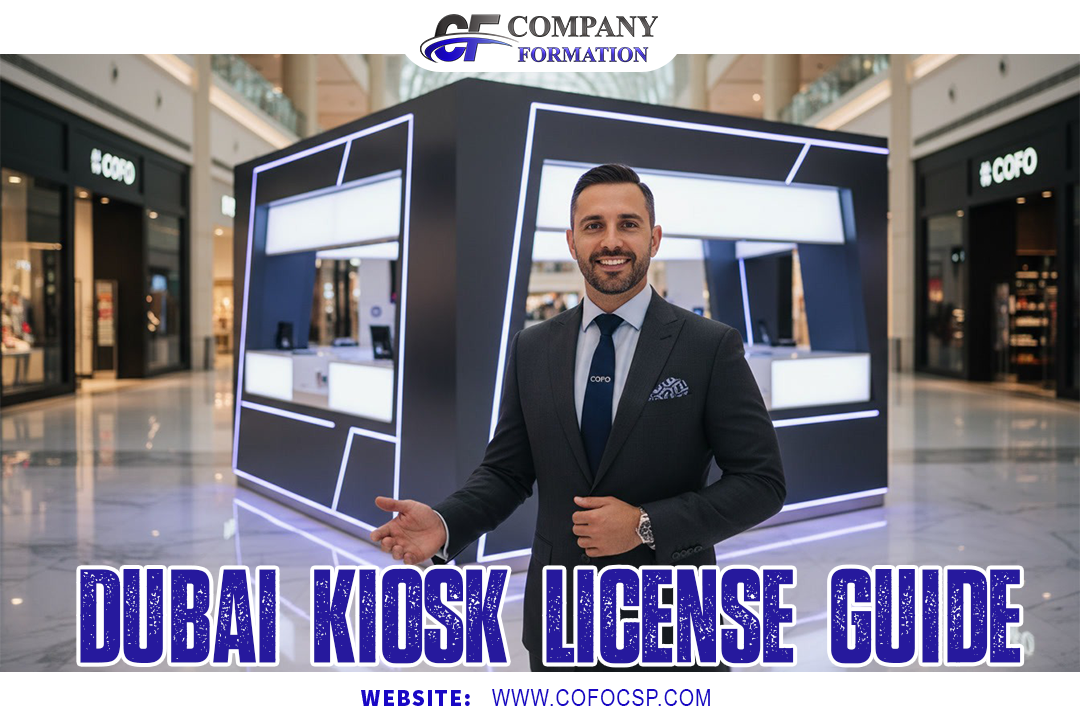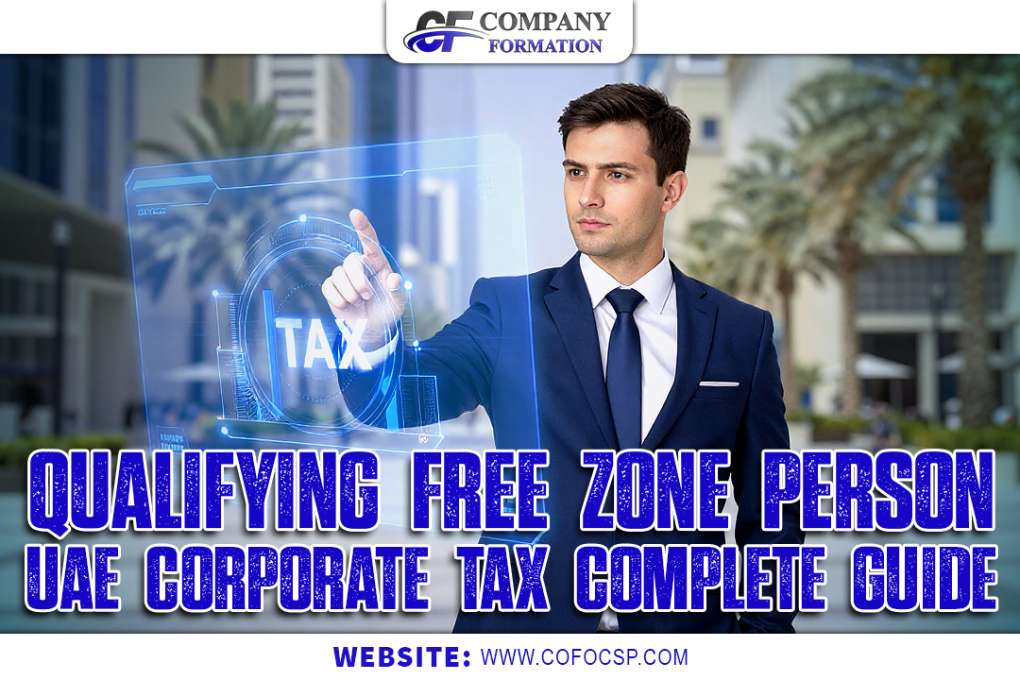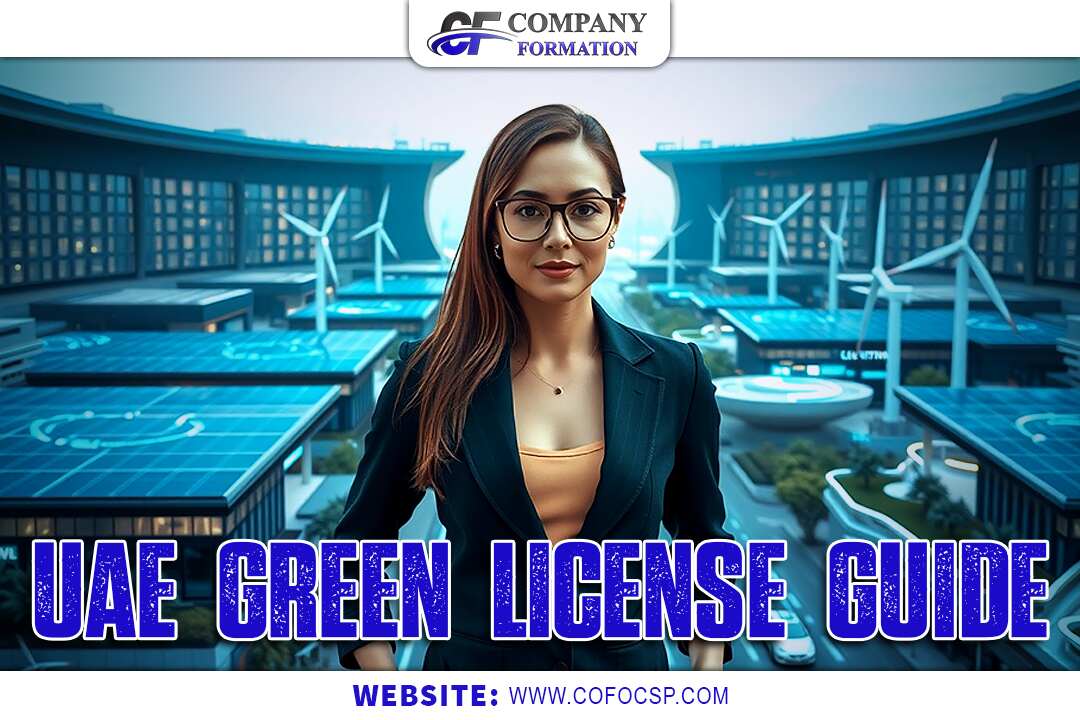Mainland vs Free Zone Companies in the UAE | Guide to Choosing the Right Setup
Mainland companies: Freely trade across the UAE and internationally, tapping into local markets with ease.
Free Zone companies: Excel in global trade, offering 100% foreign ownership and tax exemptions, but require a distributor for UAE local sales.
Free Zone vs Dubai Mainland
Oh, Dubai—where skyscrapers kiss the clouds and ambition fuels fortunes! Whether you’re a startup dreamer or a global tycoon, business setup in Dubai offers a golden ticket to opportunity. But here’s the million-dirham question: Should you go Mainland or Free Zone? This choice shapes your company formation, from ownership and licensing to costs and market reach. Our in-depth guide unravels the entities, attributes, and value of each option, empowering you to make a smart decision for your venture in this dynamic business hub. Let Company Formation Corporate Service Provider guide you to success with expert business setup solutions!
Introduction to Dubai Business Setup
Dubai isn’t just a city; it’s a global powerhouse connecting Middle East, Africa, Europe, and Asia. Once a hub for oil and pearl diving, it’s now a diversified giant in finance, technology, tourism, logistics, and real estate. Why? Because Dubai’s its strategic vision like UAE Economic Vision 2030—creates a playground for entrepreneurs. Here’s what fuels this business-friendly vibe:
- Pro-Business Legislation: The UAE’s laws, like Federal Law No. 19 of 2018, now allow 100% foreign ownership for many Mainland activities, making it easier to establish your business.
- World-Class Infrastructure: Think Jebel Ali Port, the world’s busiest airports, and cutting-edge digital networks.
- Stable Political Environment: A secure, well-regulated climate invites global players to set up regional headquarters.
- Cultural Diversity: Over 200 nationalities spark innovation, networking, and a vibrant business ecosystem.
With these attributes, Dubai is a top-tier destination for company formation in UAE. Let’s explore why investing here is a no-brainer.
Why Dubai? Key Reasons to Invest
Before diving into Free Zone vs Mainland, let’s nail down why Dubai is the place to start a business:
- Strategic Geographical Location: Dubai’s spot on the map bridges Europe, Asia, and Africa, perfect for import/export.
- Tax Efficiency: Historically tax-free, Dubai now has a 9% corporate tax (since 2023), but Free Zones often enjoy 0% tax for qualifying activities.
- Ease of Doing Business: Dubai ranks high on the World Bank’s Ease of Doing Business index, thanks to streamlined licensing via the Department of Economic Development (DED) and Dubai Economy and Tourism (DET).
- Quality of Life: World-class healthcare, schools, and a modern lifestyle attract entrepreneurs and their families.
- Infrastructure and Logistics: Global airlines like Emirates and vast cargo networks make trading seamless.
- Flexibility in Company Setup: Choose Mainland, Free Zone, or Offshore to match your business model.
These perspectives make Dubai irresistible. But which setup—Mainland or Free Zone—suits your business goals? Let’s break it down.
Mainland vs Free Zone vs Offshore
The UAE offers three business structures, each with unique attributes:
- Mainland (Onshore): Registered under the Ministry of Economy and managed by the DED/DET. Ideal for unrestricted UAE market access and international trade.
- Free Zone: Operates within special economic zones governed by a Free Zone Authority (FZA). Offers 100% foreign ownership and tax exemptions, but limits direct local market trade.
- Offshore: Registered in places like Jebel Ali Free Zone Offshore or RAK ICC. Focuses on international operations, asset protection, and confidentiality, with no local UAE trade.
While Offshore suits niche needs like tax planning, Mainland and Free Zone are the go-to for most businesses. Let’s zoom into their entity relationship mapping.
What is a Mainland Company in Dubai?
A Mainland company is your ticket to trading anywhere in the UAE and beyond. Governed by the Commercial Companies Law, it’s an onshore setup with ultimate flexibility.
A. Ownership and Local Sponsor Requirements
Gone are the days of mandatory 51% local sponsor shares! Thanks to recent UAE laws, many business activities now allow 100% foreign ownership.
- Local Sponsor: For certain sectors (e.g., oil, defense), a local partner or service agent may still be required, often charging a 5-10% fee.
- Full Foreign Ownership: Sectors like trading, consulting, and manufacturing let you retain full control.
This shift makes Mainland setups more appealing for entrepreneurs who want to own their business outright.
B. Licensing and Role of the DED/DET
The DED/DET is your gatekeeper for Mainland licensing:
- Approves trade names and business activities.
- Issues and renews trade licenses (commercial, professional, industrial).
- Ensures compliance with Ministry of Labor, Municipality, or sector-specific authorities (e.g., healthcare, education).
Process:
- Pick a legal structure (e.g., LLC, sole establishment).
- Reserve a trade name.
- Draft a Memorandum of Association (MoA) or local service agent agreement.
- Secure office space (minimum 200 sq. ft.).
- Get approvals and pay license fees.
C. Business Activities and Scope
Mainland companies shine with flexibility:
- Commercial License: For trading, retail, or logistics.
- Professional License: For consulting, marketing, or design.
- Industrial License: For manufacturing or packaging.
Key Value: Trade freely across the UAE, bid for government contracts, and open branches without restrictions.
D. Office Space and Visa Quotas
- Office Requirement: A physical office (200 sq. ft. minimum) is mandatory, boosting local market engagement.
- Visa Allocation: No cap on visas—the larger your office, the more employee visas you can secure. Ideal for scaling businesses.
E. Updated Laws and Regulations (2025)
- Corporate Tax: A 9% tax applies to net profits above ~AED 375,000 (since 2023).
- Ownership Flexibility: More business categories allow 100% foreign ownership.
- Labor Reforms: New laws ensure workplace safety, equal pay, and flexible contracts.
Mainland is perfect if you crave market reach and operational freedom. But what about Free Zone?
What is a Free Zone Company in Dubai?
A Free Zone company operates in a special economic zone managed by a Free Zone Authority (FZA). Tailored for global trade, it’s a magnet for startups and SMEs.
A. 100% Foreign Ownership Explained
Free Zones guarantee 100% foreign ownership, meaning no local sponsor needed. Predicates include:
- Full control over your business decisions.
- Tax exemptions: 0% corporate tax for qualifying activities, no import/export duties, and no personal income tax.
B. Free Zone Authority (FZA) and Licensing
Each Free Zone has its own FZA, streamlining registration and licensing:
- DMCC: For commodities like gold and diamonds.
- DIFC: For finance and fintech.
- Dubai Internet City: For tech and digital media.
- JAFZA: For logistics near Jebel Ali Port.
- SPC Free Zone: Cost-effective with dual licensing options.
The one-stop-shop approach speeds up setup (1–3 weeks).
C. Industry-Specific Free Zones
Free Zones cluster businesses by niche requirements:
- Media: Dubai Media City, Dubai Studio City.
- Healthcare: Dubai Healthcare City.
- E-Commerce: Dubai CommerCity, EZDubai.
- Logistics: JAFZA.
This creates a supportive ecosystem with networking and resources.
D. Office Options and Visa Limits
- Office Flexibility: Virtual offices or flexi-desks keep costs low.
- Visa Quotas: Typically 1–6 visas, expandable with larger office packages.
Perfect for startups or solopreneurs.
E. Complying with Corporate Tax Criteria
- Qualifying Free Zone Person: 0% corporate tax if trading only internationally or with other Free Zones.
- Non-Qualifying Activities: Selling to Mainland may trigger 9% tax.
- Audits: Some Free Zones require annual external audits.
Free Zones are a haven for tax efficiency and global operations.
Exploring Offshore Companies
Offshore companies (e.g., Jebel Ali Free Zone Offshore, RAK ICC) focus on international operations.
A. Why Offshore Over Mainland or Free Zone?
- Asset Protection: Confidentiality in shareholder registries.
- Tax Planning: Optimizes global tax strategies.
- International Focus: No local UAE trade, ideal for holdings or shipping.
B. Key Differences in Ownership and Setup
- No Physical Office: Just a registered address.
- Minimal Share Capital: Varies by jurisdiction.
- No Local Trade: Requires Mainland or Free Zone subsidiaries for UAE sales.
C. Restrictions and Drawbacks
- Local Market Exclusion: Can’t trade in UAE without a separate entity.
- Banking Challenges: Stricter AML compliance for accounts.
- Reputation: Some jurisdictions face global tax scrutiny.
Offshore suits wealth management or global operations, not local trade.
Mainland vs Free Zone: A Detailed Comparison
Let’s map the entity relationships and attributes head-to-head.
A. Ownership and Sponsorship Requirements
- Mainland: 100% foreign ownership for many activities; local sponsor for some (e.g., oil).
- Free Zone: Guaranteed 100% foreign ownership, no sponsor needed.
B. Business Scope and Market Reach
- Mainland: Unrestricted UAE market access, eligible for government contracts.
- Free Zone: Limited to Free Zone or international trade; needs a distributor for Mainland sales.
C. Licensing Procedures and Approvals
- Mainland: Managed by DED/DET, 1–4 weeks, extra steps for regulated sectors.
- Free Zone: FZA handles one-window licensing, 1–3 weeks.
D. Office Space Requirements
- Mainland: Mandatory 200 sq. ft. office, higher rents in prime areas.
- Free Zone: Virtual offices or flexi-desks, lower costs.
E. Visa Allocation Policies
- Mainland: Unlimited visas based on office size.
- Free Zone: 1–6 visas, expandable with upgrades.
F. Cost Structures and Capital Requirements
- Mainland: Setup fees ~AED 25,000–50,000; share capital ~AED 150,000–300,000 (LLC).
- Free Zone: Setup ~AED 10,000–50,000; share capital varies (AED 50,000–1,000,000).
G. Taxation and Corporate Tax Updates (2023–2025)
- Mainland: 9% corporate tax on profits >AED 375,000; 5% VAT.
- Free Zone: 0% tax for Qualifying Free Zone Persons; 9% tax for Mainland sales.
H. Potential for Government Contracts
- Mainland: Eligible for tenders.
- Free Zone: Ineligible unless partnered with a Mainland entity.
Cost Comparison: Mainland vs Free Zone vs Offshore
A. License Fees and Renewals
- Mainland: Initial fees ~AED 15,000–40,000; renewals ~AED 10,000–15,000.
- Free Zone: Initial fees ~AED 10,000–50,000; renewals 10–20% cheaper.
- Offshore: Incorporation ~AED 5,000–15,000; lower renewals.
B. Office or Workspace Costs
- Mainland: Rents ~AED 60,000+/year in prime areas.
- Free Zone: Flexi-desks ~AED 8,000–20,000; private offices ~AED 30,000–100,000.
- Offshore: No physical office needed.
C. Visa and Immigration Fees
- Mainland: Visa costs ~AED 4,000–7,000; additional labor fees.
- Free Zone: Visa fees ~AED 3,000–6,000, often bundled.
- Offshore: No UAE visas unless linked to an onshore entity.
D. Hidden or Ongoing Expenses
- Auditing, accounting, insurance, municipality fees, license renewals, and utilities.
- Pro Tip: Work with Company Formation Corporate Service Provider for transparent cost breakdowns and bundled services.
E. Tips for Cost Optimization
- Compare Free Zones for promotions.
- Negotiate office leases.
- Choose the right license category.
- Partner with Company Formation Corporate Service Provider for all-in-one setup packages.
Case Study: ModernGrocer LLC’s Journey
A. Starting Point and Goals
Meet Vanessa Holtz, a German entrepreneur launching ModernGrocer LLC, a premium grocery chain. Her search considerations:
- Widespread Presence: Stores in high-traffic UAE areas.
- Market Access: Trading across Dubai, Abu Dhabi, and Sharjah.
- Brand Visibility: Prime locations for brand growth.
- Hiring Flexibility: 30+ staff in year one.
B. Decision Process: Mainland vs Free Zone
- Free Zone: Tempting for 100% ownership and tax exemptions, but local market restrictions and limited visa quotas didn’t fit.
- Mainland: Offered unrestricted UAE trade, government tender eligibility, and scalable visas.
C. Implementation and Outcome
Vanessa chose a Mainland LLC with 100% foreign ownership. She secured:
- A DED/DET trade license.
- Multiple branches in prime areas.
- Government contract opportunities.
Outcome: ModernGrocer became a UAE retail star, proving Mainland’s power for local market reach.
Sector-Specific Insights
A. Technology Startups
- Free Zone: Dubai Internet City, in5, or DTEC offer tech ecosystems.
- Mainland: Ideal for local sales or government IT projects.
B. Healthcare Providers
- Free Zone: Dubai Healthcare City for clinics and labs.
- Mainland: Direct patient access and public tenders.
C. Media and Entertainment
- Free Zone: Dubai Media City for production and broadcasting.
- Mainland: For event management across UAE.
D. Financial Services
- Free Zone: DIFC for fintech and banking.
- Mainland: For local consultancies or insurance.
E. E-Commerce Ventures
- Free Zone: Dubai CommerCity for logistics and warehousing.
- Mainland: For B2C sales and local marketplace integration.
Why Consider Dual Licensing?
Dual licensing blends Free Zone perks with Mainland access.
A. Advantages of Operating in Both
- Maximized Reach: Trade globally and locally.
- Diverse Operations: Leverage Free Zone tax benefits and Mainland flexibility.
- Brand Visibility: Prime Mainland offices.
- Streamlined Processes: FZAs and DEDcollaborate.
B. Regulatory Steps
- Establish Free Zone Entity.
- Apply for Mainland License.
- Comply with Sponsor Rules (if needed).
- Manage Dual Renewals.
Company Formation Corporate Service Provider simplifies dual licensing for seamless growth.
FAQs for Mainland vs Free Zone
Q1: Can I convert a Free Zone company to Mainland?
A: Yes, but it involves canceling your Free Zone license and reapplying via DED. Some Free Zones offer dual licensing for easier transitions.
Q2: Does the 9% corporate tax apply to all Mainland companies?
A: Only for profits above ~AED 375,000. Small businesses may qualify for 0% tax.
Q3: How do I open a corporate bank account?
A: Provide your trade license, MoA, and office address. Mainland setups face fewer hurdles.
Q4: Are there office space restrictions in Mainland Dubai?
A: Offices must be in commercial zones with 200 sq. ft. minimum.
Q5: Which Free Zone is the cheapest?
A: SPC Free Zone often offers deals, but compare renewal fees and visa quotas.
Q6: Can Offshore companies trade locally?
A: No, unless they open a Mainland or Free Zone branch.
Q7: Is a local sponsor mandatory for Mainland?
A: Not for most activities, thanks to 100% ownership laws.
Q8: Do Mainland companies need annual audits?
A: Yes, for financial transparency.
Conclusion
Mainland or Free Zone? Your choice hinges on:
- Market Focus: Mainland for UAE-wide trade; Free Zone for global reach.
- Ownership: Both offer 100% foreign ownership in many cases.
- Budget: Free Zone for lower setup costs; Mainland for scalability.
- Growth: Mainland for unlimited visas; Free Zone for industry clusters.
- Regulations: Check business activity rules with Company Formation Corporate Service Provider.
Want the best of both worlds? Dual licensing merges tax benefits with market access. For international holdings, Offshore is your go-to. Let Company Formation Corporate Service Provider—your trusted business setup Consultant—guide you.
